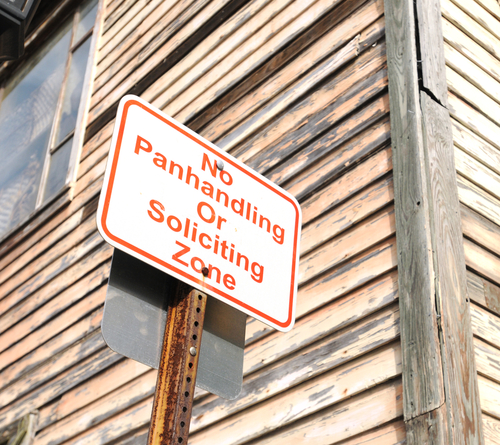
by Duwayne Escobedo
INWEEKLY
Pensacola Mayor Ashton Hayward and the City Council have tried to boot panhandlers out of downtown for years without success.
The council is scheduled at its Sept. 14 regular meeting to repeal its latest effort once and for all. They passed on May 11 an ordinance, sponsored by Council President Brian Spencer and Mayor Hayward, that banned panhandling in the “Downtown Visitors District.†When the ACLU filed a lawsuit questioning its constitutionality, Mayor Hayward and Police Chief Tommi Lyter suspended its enforcement.
The problem is a 2015 decision by the U.S. Supreme Court ruling that expanded protections for free speech, which the ACLU and others believe make the new law unconstitutional.
ACLU attorney Benjamin Stevenson said the council’s decisions have baffled him.The ACLU warned the city before it voted the ordinance that it would be struck down.
“They could have saved a lot of time and effort,†he said. “We told them there were constitutional problems. We’re hopeful they’ll repeal it.â€
The Pensacola City Council approved the ordinance based on assurances from City Attorney Lysia Bowling that the law would stand up in court. Mayor Hayward assured the members he would fight any challenges…that was until the lawsuit was filed in federal court. For more information, check out our April 28 cover story “Pensacola’s Panhandling Dilemma.”
Pensacola joins Washington, D.C., Houston and Oklahoma City in constitutional challenges to its laws. Already, cities in Colorado, Florida, Illinois and Massachusetts have had their panhandling ordinances struck down by federal judges, the Wall Street Journal reported.
Plus, other cities, repealed laws on their books or halted plans to enact them after the U.S. Supreme Court decision two years ago.
The Wall Street Journal cited a National Law Center on Homelessness & Poverty study that looked at 187 cities in 2016 and found that 27 percent enacted broad bans on panhandling, while 61 percent passed bans in certain public areas, like Pensacola did. Overall, citywide bans increased 43 percent since 2006.
Instead of “Band-Aid†laws outlawing panhandling Stevenson and others have recommended Pensacola and other cities should invest in more impactful programs that address homelessness, mental illness and substance abuse.
Stevenson said the ACLU and Pensacola are negotiating a settlement to reimburse the nonpartisan organization committed to fighting egregious civil liberties abuses.
“We’re working on a settlement with the city,†he said. “This is the first case (in Florida) that we’ve done in the last few years.â€



